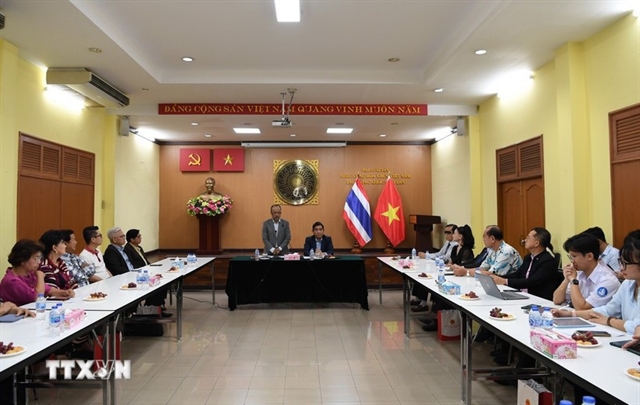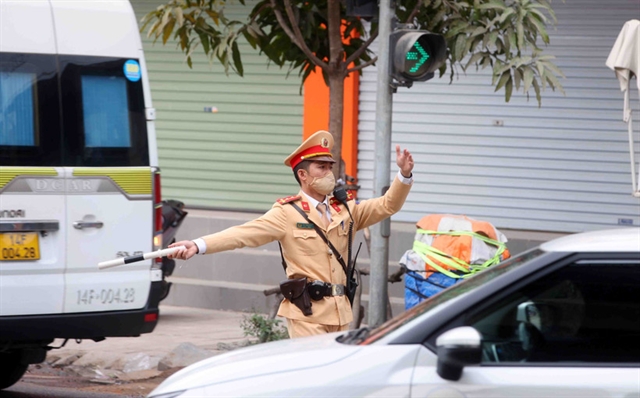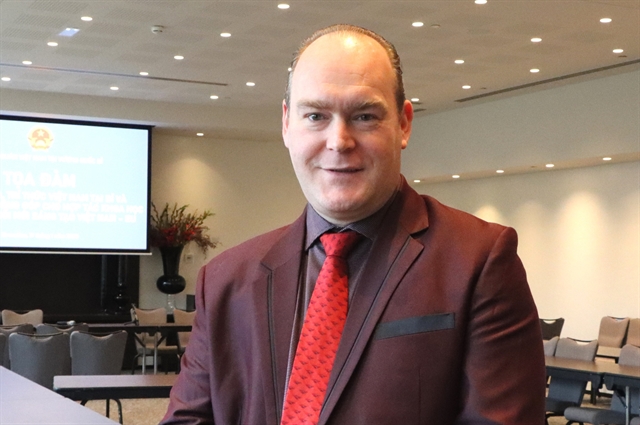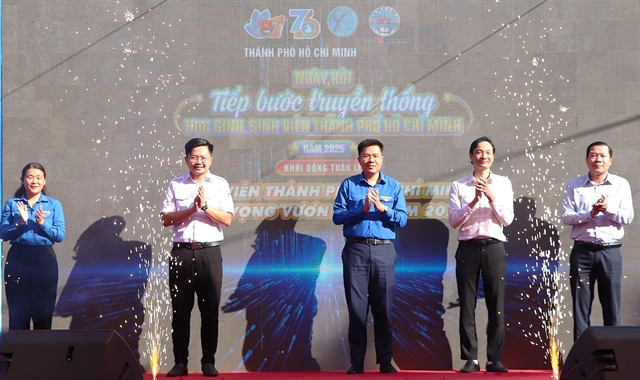

There are some very special business people in Việt Nam. They start little enterprises that also aim to help poor people. Their stories have all been written up in a special book.
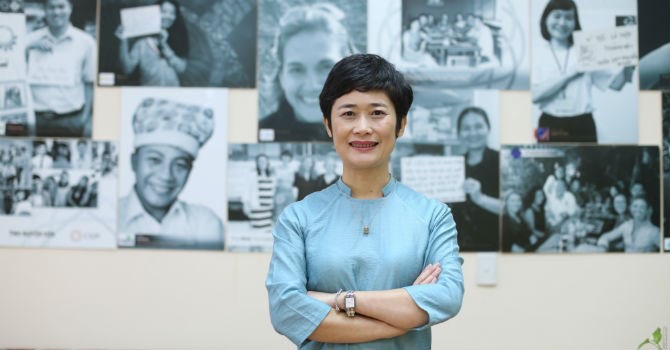 |
| The book is the brainchild of Phạm Kiều Oanh, a social worker and community developer, who first encountered the concept of social enterprises more than 10 years ago. — Photo baomoi.com |
There are some very special business people in Việt Nam.
They do not simply try to make money, money and more money.
They start little enterprises that also aim to do things like provide books to children, help people with poor hearing, stop children dropping out of school and help poor women earn better money.
Their stories have all been written up in a special book.
By Ruti Sinai
“The reasonable man adapts himself to the world: the unreasonable one persists in trying to adapt the world to himself. Therefore, all progress depends on the unreasonable man.” This aphorism, coined more than 100 years ago by George Bernard Shaw in his play Man and Superman, sums up the essence of the 27 women and men whose stories are told in Vietnamese and English in a newly published compilation entitled Redefining Success.
They are social entrepreneurs, people who establish startups based on various business models to develop and fund solutions to social, cultural, or environmental problems. In Việt Nam, where “startup” has become a pervasive buzzword denoting progress and financial success, the concept of social startups is little known. The book aims to awaken awareness of the idea and inspire its development.
Almost 40 years ago, British Prime Minister Margaret Thatcher insisted that the weaker members of society should be given fishing rods rather than fish – tools with which to change their lives, rather than welfare payments that perpetuate their dependence. With immense compassion and drive, the social entrepreneurs featured in this book do just that.
“They and the vulnerable people they serve have not only found their own fishing rods, but also figured out how to fish, how to process the fish, how to distribute it for consumption,” writes Dr Đặng Hoàng Giang, a social activist.
The book’s protagonists are both men/women and supermen/women. Some have known disadvantage or tragedy. In their modest patch, each strives to change the communities in which they live. The book follows their ups and downs, the dreams and naiveté often warring with despair, as they confront the lack of material resources to carry out their vision.
The book is the brainchild of Phạm Kiều Oanh, a social worker and community developer, who first encountered the concept of social enterprises more than 10 years ago.
“At the time, I thought the business world had nothing to do with the community development work. I simply assumed that it was the responsibility of profit-making companies to shoulder part of the funding for community development, and we should mind our own business,” she writes.
After being exposed to the work of The One Foundation in Ireland and similar groups, Oanh started realising how the power of business could be efficiently harnessed to address social issues and affect change. In 2008 she established the Center for Social Initiatives Promotion (CSIP). Over the past eight years, CSIP in collaboration with local and foreign partners, has established the initial foundation for a social enterprise community in Việt Nam.
One member of the community is Nguyễn Quang Thạch, and this is how he started out on a quest to improve education for children in rural Việt Nam.
“He wanders the country in a white, worn-out shirt, dirty Adidas shoes with worn soles. His entire luggage can fit in an old backpack. He eats at roadside food stalls, asks to spend the night at people’s homes. He travels 20 kilometres a day on foot, only stopping to give out books and talk to students and parents. There are also days when he is sick and cannot drag himself about any longer. But once he gets better, he gets going,” the book describes.
Thạch has invented the Family Bookshelf, the Parent Bookshelf and other literacy projects. So far, communities have built more than 10,000 bookshelves, spreading the reading culture to regions where it did not exist.
The “business model” was simple: “If each individual were to donate a few hundred thousand đồng (US$10-40) a year… a whole generation could be ‘intellectually literate’ and change the nation’s future,” Thạch explains. In 2016, he was one of two individuals awarded the King Sejong Literacy Prize by UNESCO.
Other soldiers in this battle for a more humane, just society have achieved different kinds of recognition. Dương Phương Hạnh lost most of her hearing as a child. Until the age of 40 she lived in a world of virtual silence, alternately embarrassed by her disability and fearful of losing her livelihood. The book describes a journey that culminated in her founding of the Centre for Consultancy & Education of the Deaf and Hard of Hearing in 2016, the first and only social organisation in Việt Nam founded by and serving the hearing-impaired.
The initiatives are based on different business models and goals. Most if not all these entrepreneurs had no experience in business. Social workers Thái Thị Lê Khanh and Lê Phương, for example, started a project to prevent children from dropping out of school and support poor women in improving their income in 1990. The project has evolved into a social organization called Mai Vietnamese Handicraft, which employs 22 women and generates at least US$1million a year.
Whether developing chemical-free farming, reviving the art of calligraphy, preserving traditional ethnic minority culture and enabling it to flourish, the initiatives all have one thing in common: they redefine the notion of success in a materialistic world. Formally defined as not-for-profit enterprises, they profit society. VN
GLOSSARY
They are social entrepreneurs, people who establish startups based on various business models to develop and fund solutions to social, cultural, or environmental problems.
A business model is a plan that somebody running a business can follow and in doing so stand a chance of being successful.
In Việt Nam, where “startup” has become a pervasive buzzword denoting progress and financial success, the concept of social startups is little known.
Pervasive means something that many people very quickly start using as a result of it spreading.
A buzzword is a fashionable word.
Denoting means “meaning”.
A concept is an idea.
Almost 40 years ago, British Prime Minister Margaret Thatcher insisted that the weaker members of society should be given fishing rods rather than fish – tools with which to change their lives, rather than welfare payments that perpetuate their dependence.
Welfare payments are payments made to people who are suffering from one or other problem and need help to survive.
Perpetuate means to make something carry on and on.
Dependence means needing somebody, or something.
With immense compassion and drive, the social entrepreneurs featured in this book do just that.
Immense means huge.
Compassion means pity.
“They and the vulnerable people they serve have not only found their own fishing rods, but also figured out how to fish, how to process the fish, how to distribute it for consumption,” writes Dr Đặng Hoàng Giang, a social activist.
Vulnerable people are people who could easily suffer.
Consumption means using something. In this case it would be using fish, to eat.
The book’s protagonists are both men/women and supermen/women.
Protagonists in a book are the leading characters.
In their modest patch, each strives to change the communities in which they live.
Strives means tries, or attempts.
The book follows their ups and downs, the dreams and naiveté often warring with despair, as they confront the lack of material resources to carry out their vision.
Naiveté means lack of wisdom and experience.
Warring means fighting or being in conflict.
Despair means hopelessness.
To confront means to face someone, or something, head on.
A lack of material resources means not having many things.
A vision is a dream.
The book is the brainchild of Phạm Kiều Oanh, a social worker and community developer, who first encountered the concept of social enterprises more than 10 years ago.
If you come up with an idea or an invention, it is your brainchild.
After being exposed to the work of The One Foundation in Ireland and similar groups, Oanh started realising how the power of business could be efficiently harnessed to address social issues and affect change.
To be exposed to something means to get to see it, experience it and know it.
Harness means to take control.
Over the past eight years, CSIP in collaboration with local and foreign partners, has established the initial foundation for a social enterprise community in Việt Nam.
In collaboration means working together.
Thạch has invented the Family Bookshelf, the Parent Bookshelf and other literacy projects.
Literacy means reading.
The “business model” was simple: “If each individual were to donate a few hundred thousand đồng (US$10-40) a year… a whole generation could be ‘intellectually literate’ and change the nation’s future,” Thạch explains. In 2016, he was one of two individuals awarded the King Sejong Literacy Prize by UNESCO.
Intellectually literate means clever and able to read.
Other soldiers in this battle for a more humane, just society have achieved different kinds of recognition.
Humane means kind heartedness.
Just means fair.
Recognition means being seen as valuable.
Dương Phương Hạnh lost most of her hearing as a child. Until the age of 40 she lived in a world of virtual silence, alternately embarrassed by her disability and fearful of losing her livelihood.
Virtual silence means almost silent, not total silence.
To be embarrassed means to feel very uncomfortable, awkward and ashamed.
The book describes a journey that culminated in her founding of the Centre for Consultancy & Education of the Deaf and Hard of Hearing in 2016, the first and only social organisation in Việt Nam founded by and serving the hearing-impaired.
Culminated means reached a high point.
Founding means starting.
Hearing-impaired means deaf or slightly deaf.
Whether developing chemical-free farming, reviving the art of calligraphy, preserving traditional ethnic minority culture and enabling it to flourish, the initiatives all have one thing in common: they redefine the notion of success in a materialistic world.
Reviving something means bringing it back to life.
Calligraphy is beautiful handwriting that can be used as a decoration.
Preserving means keeping.
To have things in common means to have things that are the same.
Redefine means to give something a new meaning.
A notion is a belief.
A materialistic world is a place where people believe it is very important to own lots of things.
WORKSHEET
© Duncan Guy/Learn the News/ Viet Nam News 2017
1. True; 2. False; 3. False; 4. True; 5. True.

